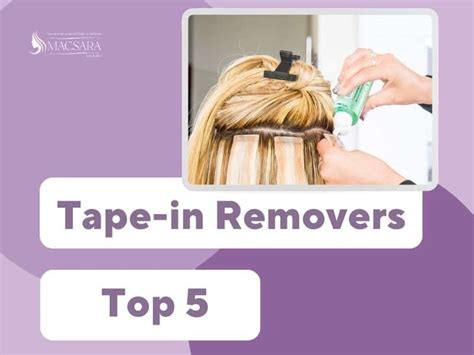Introduction
Tape-in hair extensions are a popular choice for those seeking a quick and convenient way to add length and volume to their hair. However, removing them without damaging your natural hair can be a daunting task. Enter tape-in extension removers, specialized products designed to dissolve the adhesive bond that holds the extensions in place.

Understanding Tape-In Extensions and Adhesives
Tape-in extensions consist of human or synthetic hair attached to double-sided tape tabs. The tape tabs are then sandwiched between two strands of your natural hair, creating a secure hold. Over time, the adhesive in the tape tabs may weaken or deteriorate, leading to the need for removal.
The Importance of Using a Tape-In Extension Remover
Using a tape-in extension remover is crucial for several reasons:
- Protects Natural Hair: Extension removers are formulated to dissolve the adhesive without damaging your delicate natural hair.
- Efficient Removal: They break down the bond between the tape and your hair, making removal quick and effortless.
- Reduces Damage: Attempting to remove extensions without a remover can lead to breakage, matting, or scalp irritation.
Types of Tape-In Extension Removers
There are two main types of tape-in extension removers:
- Liquid: Applied directly to the tape tabs using a dropper or brush, liquid removers dissolve the adhesive in several minutes.
- Spray: Sprayed onto the root area, spray removers work by penetrating the tape and weakening the bond.
How to Use a Tape-In Extension Remover
Materials:
- Tape-in extension remover
- Comb or brush
- Clips
- Towel (optional)
Instructions:
- Section Hair: Divide your hair into small sections and clip away the rest to work on one section at a time.
- Apply Remover: Apply the remover directly to the tape tabs, ensuring even coverage.
- Wait: Allow the remover to sit for the specified amount of time (typically 3-5 minutes).
- Comb Through: Gently comb through the extensions to loosen them.
- Remove: Slide the extensions down and off your natural hair.
- Rinse and Condition: Thoroughly rinse your hair to remove any remaining adhesive residue. Apply conditioner to nourish and hydrate your natural hair.
Troubleshooting and Tips for Removal
- Avoid Excessive Force: Over-pulling or tugging can damage your natural hair. If an extension is not easily removed, reapply remover and allow it more time to work.
- Use a Wide-Toothed Comb: A fine-toothed comb can snag and break hair. Opt for a wide-toothed comb to gently loosen extensions without causing damage.
- Heat can Help: Use a blow dryer on the lowest heat setting to soften the adhesive and make removal easier.
- Protect Your Scalp: Wear a towel or scarf around your neck to prevent remover from dripping onto your scalp, which can cause irritation or allergic reactions.
Common Mistakes to Avoid
- Using Alcohol or Acetone: These harsh solvents can damage your hair and scalp.
- Pulling Extensions Straight Up: This can cause the adhesive to stick to your scalp and be painful to remove.
- Neglecting Aftercare: Rinsing and conditioning your hair after extension removal is essential to remove any remaining residue and protect your natural hair.
Frequently Asked Questions
-
How often should I remove tape-in extensions?
Typically every 6-8 weeks, or as recommended by your stylist. -
Can I reuse tape-in extensions?
Yes, but the adhesive may need to be replaced. Consult with your stylist for guidance. -
Is it safe to use tape-in extension removers every time I remove extensions?
Yes, as long as the product is used according to the manufacturer’s instructions. -
What do I do if the remover does not work?
Reapply the remover and allow it to sit for longer. If the extensions still do not loosen, consult with a professional stylist for assistance. -
Can I use tape-in extension remover on other types of extensions?
No, it is specifically designed for tape-in extensions. -
What should I do if I experience scalp irritation after using a tape-in extension remover?
Rinse your scalp thoroughly with cool water and apply a gentle shampoo and conditioner. If irritation persists, consult with a dermatologist.
Conclusion
Tape-in extension removers are a safe and effective way to remove tape-in extensions without damaging your natural hair. By following the instructions and tips provided, you can ensure a seamless removal process and maintain the health and integrity of your hair.
